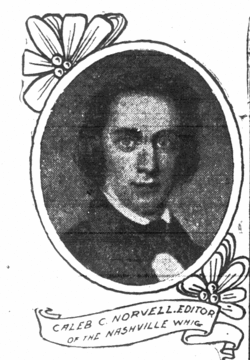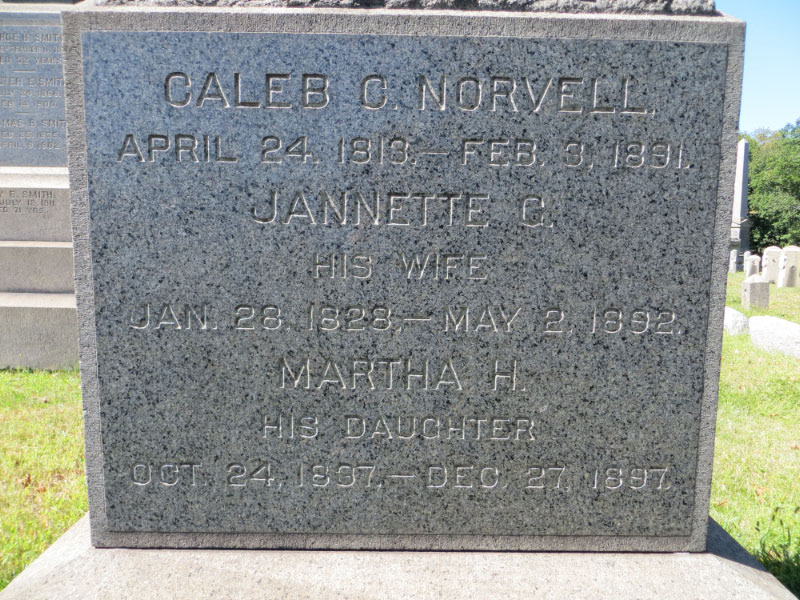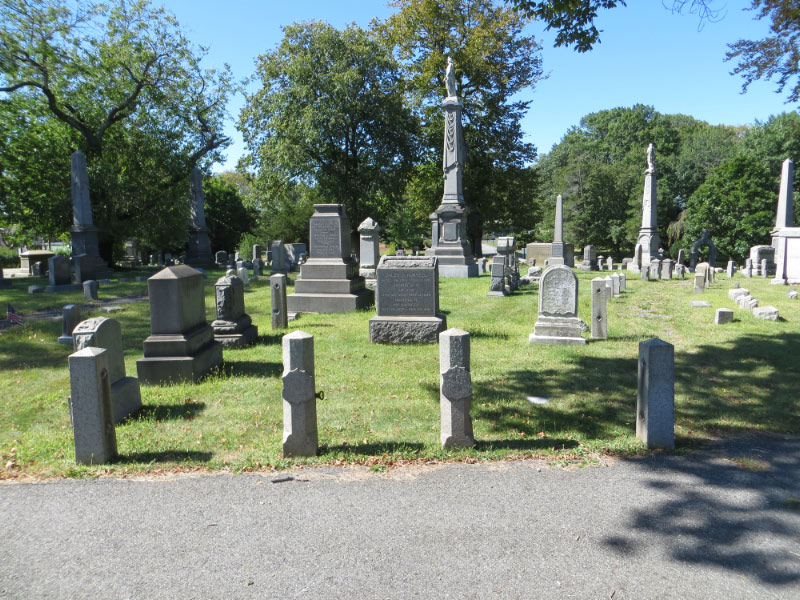On June 27, 1833 he married Catherine Mary Carroll (born December 8, 1816 -died October 2, 1842, buried in the Mt Olive Cemetery), the niece of William Carroll, who was Governor of Tennessee six times. After her death he married March 4, 1844 Jeanette Gordon (born April 24, 1814), the daughter of Captain James Gordon. Caleb edited the Nashville Whig newspaper and was active in the literary and musical life of Nashville. He also did much printing for the State of Tennessee: 1837 provided newspapers to the General Assembly, 1841-45 Printer to the House of Representatives, and from 1843-47 printer for General Assembly. In 1837, he became editor of the Commercial Transcript, but returned to the Whig in 1838. Later, he was the financial editor of the New York Times and lived on Staten Island.
His obituary appeared in the New York Times:
Caleb C. Norvell
Mr. C.C Norvell, at one time connected with the editorial staff of The New York Times, and more recently a writer on the Commercial Advertiser, but who retired from active service a few years ago, died at Washington early yesterday morning after a short illness at the house of Mr. R. J. Meigs on New-Jersey Avenue. Mr Norvell who had gone to that city for a visit, was in feeble health. He contracted a severe cold, which speedily terminated his life. His son went to Washington upon learning of his father's death and returned to this city with the body yesterday.
In the days when Wall Street made history very fast the opinions of few men were held in higher regard than those of Caleb O. Norwell. His aptitude for financial observation and criticism, although strong by nature, had been developed by years of experience in newspaper writing until he stood well in the front among Wall Street oracles. The reputation which he enjoyed as a financial writer was won in the service of The Times. He had charge of the Financial columns of this paper from 1851 to 1874, when he projected the Republic, a newspaper of short life and fruitful only in vexatious losses to all concerned In it. The venture cost Mr. Norvell nearly all he had.
From this time fortune did not favor him. He became financial editor of the Commercial Advertiser, but remained with that paper less than one year. His friends on Staten Island, recognizing and respecting his abilities, nominated him for Congress in 1878. The Democratic majority in the district was too large for him to overcome. Ho had worked hard for election, and was for a time disheartened by his defeat. Then he returned to Wall Street, and for several years issued a weekly financial letter for which some of the banks and many hankers subscribed.
This was his principal occupation until last Summer. Of late years he had become an ardent advocate of a National Bank of the United States. He claimed to have assurance of support from those high in authority. Plans for that project took him to Washington, where he died.
Newspaper work in the years when Mr. Norvell was connected with The Times required all-around service rather more than it does now. Thus, while naturally a specialist in finance, Mr. Norvell took a hand at everything. Ha developed skill in political writing. His faculty for figures made him very valuable In this line. He displayed a most marvelous memory for local majorities, and as returns came in he was able to carry election figures in his mind from year to year and to fill out columns of comparisons with scarcely a reference to newspaper files. He devoted some of his time also to book reviews, especially in matters relating to finance or polities. Upon those subjects also he wielded a strong editorial pen.
Mr. Norvell was born in Nashville, Tenn., seventy-seven years ago. He went to Philadelphia when a young man and. entered a banking house. Afterward he became financial editor of the Philadelphia Ledger, remaining in that position until be joined the staff of The Times. For more than twenty years past be lived at New Brighton, L. I. A wife, a son. and a daughter survive him. The son, Duncan Norvell is chief clerk in charge of the Produce Exchange Gratuity Fund.
On June 27, 1833 he married Catherine Mary Carroll (born December 8, 1816 -died October 2, 1842, buried in the Mt Olive Cemetery), the niece of William Carroll, who was Governor of Tennessee six times. After her death he married March 4, 1844 Jeanette Gordon (born April 24, 1814), the daughter of Captain James Gordon. Caleb edited the Nashville Whig newspaper and was active in the literary and musical life of Nashville. He also did much printing for the State of Tennessee: 1837 provided newspapers to the General Assembly, 1841-45 Printer to the House of Representatives, and from 1843-47 printer for General Assembly. In 1837, he became editor of the Commercial Transcript, but returned to the Whig in 1838. Later, he was the financial editor of the New York Times and lived on Staten Island.
His obituary appeared in the New York Times:
Caleb C. Norvell
Mr. C.C Norvell, at one time connected with the editorial staff of The New York Times, and more recently a writer on the Commercial Advertiser, but who retired from active service a few years ago, died at Washington early yesterday morning after a short illness at the house of Mr. R. J. Meigs on New-Jersey Avenue. Mr Norvell who had gone to that city for a visit, was in feeble health. He contracted a severe cold, which speedily terminated his life. His son went to Washington upon learning of his father's death and returned to this city with the body yesterday.
In the days when Wall Street made history very fast the opinions of few men were held in higher regard than those of Caleb O. Norwell. His aptitude for financial observation and criticism, although strong by nature, had been developed by years of experience in newspaper writing until he stood well in the front among Wall Street oracles. The reputation which he enjoyed as a financial writer was won in the service of The Times. He had charge of the Financial columns of this paper from 1851 to 1874, when he projected the Republic, a newspaper of short life and fruitful only in vexatious losses to all concerned In it. The venture cost Mr. Norvell nearly all he had.
From this time fortune did not favor him. He became financial editor of the Commercial Advertiser, but remained with that paper less than one year. His friends on Staten Island, recognizing and respecting his abilities, nominated him for Congress in 1878. The Democratic majority in the district was too large for him to overcome. Ho had worked hard for election, and was for a time disheartened by his defeat. Then he returned to Wall Street, and for several years issued a weekly financial letter for which some of the banks and many hankers subscribed.
This was his principal occupation until last Summer. Of late years he had become an ardent advocate of a National Bank of the United States. He claimed to have assurance of support from those high in authority. Plans for that project took him to Washington, where he died.
Newspaper work in the years when Mr. Norvell was connected with The Times required all-around service rather more than it does now. Thus, while naturally a specialist in finance, Mr. Norvell took a hand at everything. Ha developed skill in political writing. His faculty for figures made him very valuable In this line. He displayed a most marvelous memory for local majorities, and as returns came in he was able to carry election figures in his mind from year to year and to fill out columns of comparisons with scarcely a reference to newspaper files. He devoted some of his time also to book reviews, especially in matters relating to finance or polities. Upon those subjects also he wielded a strong editorial pen.
Mr. Norvell was born in Nashville, Tenn., seventy-seven years ago. He went to Philadelphia when a young man and. entered a banking house. Afterward he became financial editor of the Philadelphia Ledger, remaining in that position until be joined the staff of The Times. For more than twenty years past be lived at New Brighton, L. I. A wife, a son. and a daughter survive him. The son, Duncan Norvell is chief clerk in charge of the Produce Exchange Gratuity Fund.
Family Members
Advertisement
Records on Ancestry
Advertisement

























